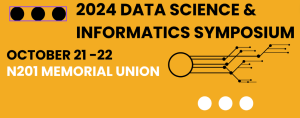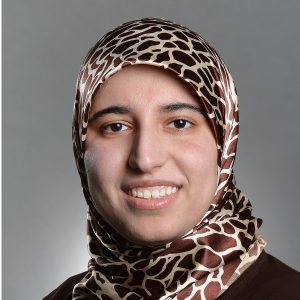
Oct. 14, 2024
2024 MUIDSI Symposium
The 14th Missouri Data Science and Informatics Symposium will be held on October 21-22, 2024. This year’s theme is “Using Artificial General Intelligence for Good.” We are excited to present exceptional keynote speakers, faculty research highlights, student presentations and posters. In addition to academic talks, we are featuring industry presentations showcasing emerging technologies in AI and quantum computing. This symposium continues a proud tradition of being organized by the MU IDSI Graduate Student Organization (GSO), which handles everything from planning to execution. For more details on the program, please visit: Symposium Program to register for the Symposium.

Nov. 14, 2022
MUIDSI Dissertation Defense: IDENTIFICATION OF IMMUNE-RELATED GENE SIGNATURES TO EVALUATE IMMUNOTHARAPEUTIC RESPONSE IN CANCER PATIENTS USING EXPLORATORY SUBGROUP DISCOVERY
Phenotypic and genotypic heterogeneity are characteristic features of cancer patients. To tackle patients’ heterogeneity, immune checkpoint inhibitors (ICIs) represent one of the most promising therapeutic approaches. However, approximately 50% of cancer patients that are eligible for treatment with ICIs will not respond well, which motivates the exploration of immunotherapy in combination with either targeted treatments or chemotherapy. Over the years, multiple patient stratification techniques have been developed to identify homogenous patient subgroups, although, matching patient subgroup to treatment option that can improve patients’ health outcome remains a challenging task. We extend our exploratory subgroup discovery algorithm to identify patient subpopulations…

Sep. 6, 2022
MUIDSI DISSERTATION DEFENSE: Explainable Artificial Intelligence To Stratify Pan-Cancer Patients For Immune Checkpoint Inhibitor Decision Making
Immune checkpoints are a normal part of the immune system. It engages when proteins on the surface of immune cells called T cells recognize and bind to partner proteins on other cells, such as some tumor cells. Immune based therapies such as ICIs work by blocking checkpoint proteins from binding with their partner proteins. This prevents the “off” signal from being sent, allowing the T cells to kill cancer cells. One such drug act against a checkpoint protein called PD-1 or its partner protein PD-L1. Some tumors turn down the T cell response by producing lots of PD-L1. Recent years…

July 25, 2022
MUIDSI Comprehensive Exam — Measuring Geodiversity in Remotely-Sensed Imagery: Deep Spatial Change Detection Methods for Dataset Bias Mitigation and Visual Landscape Characterization
Amid explosive growth in availability of multimodal remotely sensed imagery (RSI) data from a constellation of overhead sensors, a lack of understanding persists concerning the actual content of these data sources, in particular the nature of spatial variation in the visual and contextual features in the landscape being imaged. Whether described as spatial domain shift, geographic feature variance or simply geodiversity, this gap of knowledge about RSI dataset content comes with important implications. On one hand, there is a lack of tools to evaluate heterogeneity and representativeness of objects classes found in labeled RSI training datasets, in particular methods for regional…

May 19, 2022
GIScience as an Interdisciplinary Bridge in Indigenous Health Equity
GIS and geographic theories can help bridge a crucial gap in interdisciplinary research projects. Geography is uniquely poised to offer critical and practical analytical support, wrangle spatial data and relate them to other datasets, and ground community-based science within the communities it aims to serve. In the context of the Navajo Nation, a key concern is relating potential exposure to environmental contaminants with cultural identity and the social ramifications of resource extraction. Daniel Beene (DaRBeene@salud.unm.edu) is a Ph.D. student in the Department of Geography and Environmental Studies and a trainee with the METALS (Metals Exposure…

April 4, 2022
Dissertation Defense – UNDERSTANDING GENOME COMPOSITION OF EUSOCIAL HYMENOPTERAN INSECTS
Genome sequencing of the Western honey bee (Apis mellifera), a model for the biology and evolution of eusocial behavior, has revealed unusual genome compositional characteristics, including a low but heterogeneous GC content, bimodal GC content distribution, and a biased tendency of genes to be located in low GC regions. In this dissertation, we sought to determine whether those features are specific to Apis or shared with other insects and the biological meaning of those features. Chapter 1 reviews the major concepts that tie my dissertation research together, highlighting the importance of recombination, GC composition, and their relationship to the evolution of eusociality.

March 25, 2022
Comprehensive Exam: Accelerating Data-Driven Discovery In Type 1 Diabetes:An Informatics-Based Approach
Type 1 diabetes (T1D) is an immune-associated or immune-mediated chronic disease characterized by the progressive failure or targeted destruction of insulin-producing beta (β) cells in the pancreas. Management of the disease is challenging, involving lifelong exogeneous insulin replacement and 24/7 blood glucose monitoring. Although more than 1.6 million Americans are living with T1D, most diabetes research is currently focused on type 2 diabetes (T2D), which accounts for approximately 90% of diabetes cases. The expanding availability, granularity, and size of real-world health data, however, is opening unprecedented opportunities to use health informatics to advance T1D research that is computationally innovative and responsive…

March 18, 2021
Computational Subgroups Stratification and Precision Drug Repositioning Using Explainable Artificial Intelligence
Enabling precision medicine requires developing robust patient stratification methods and identifying drugs tailored to homogeneous subgroups of patients from a heterogeneous population. Once discovering these subgroups, we can align patients and medications more specifically to achieve precision-based therapy. Developing de novo drugs is expensive and time-consuming with an ultimately low FDA approval rate. These limitations make developing new drugs for a small portion of a disease population unfeasible. Therefore, drug repositioning (DR) is an essential alternative for developing new drugs for a disease subpopulation. DR reduces the time, cost, and risk associated with a new drug. It is essential to develop data-driven approaches…

March 17, 2021
Virtual Campus Visit with NSF CISE AD Dr. Margaret Martonosi
The National Science Foundation (NSF) supports a majority of US academic research in the Computer and Information Science and Engineering (CISE) topic areas. Since February, 2020, Dr. Margaret Martonosi serves as NSF CISE AD, stewarding the CISE directorate’s $1B annual budget on behalf of research, education, workforce and infrastructure funding in CISE topic areas and for science as a whole. Martonosi is conducting a series of “virtual campus visits” to engage in conversation about a vision for CISE research going forward, and to field Q&A from the CISE community. Please join us for this highly-interactive session and please bring your input and questions! BioMargaret Martonosi is the US…